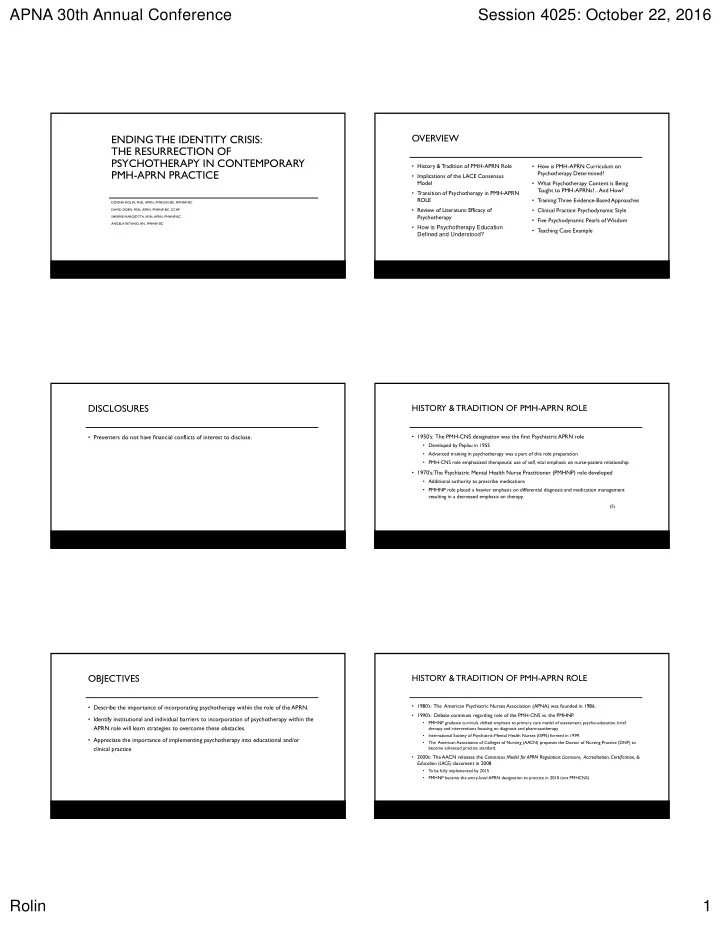

APNA 30th Annual Conference Session 4025: October 22, 2016 ENDING THE IDENTITY CRISIS: OVERVIEW THE RESURRECTION OF PSYCHOTHERAPY IN CONTEMPORARY • History & Tradition of PMH-APRN Role • How is PMH-APRN Curriculum on PMH-APRN PRACTICE Psychotherapy Determined? • Implications of the LACE Consensus Model • What Psychotherapy Content is Being Taught to PMH-APRNs?... And How? • Transition of Psychotherapy in PMH-APRN ROLE • Training: Three Evidence-Based Approaches DONNA ROLIN, PHD, APRN, PMHCNS-BC, PMHNP-BC • Review of Literature: Efficacy of • Clinical Practice: Psychodynamic Style DAVID GOEN, MSN, APRN, PMHNP-BC, CCHP Psychotherapy SHERRIE MARGIOTTA, MSN, APRN, PMHNP-BC • Five Psychodynamic Pearls of Wisdom ANGELA RETANO, RN, PMHNP-BC • How is Psychotherapy Education • Teaching Case Example Defined and Understood? DISCLOSURES HISTORY & TRADITION OF PMH-APRN ROLE • Presenters do not have financial conflicts of interest to disclose. • 1950’s: The PMH-CNS designation was the first Psychiatric APRN role • Developed by Peplau in 1955 • Advanced training in psychotherapy was a part of this role preparation • PMH-CNS role emphasized therapeutic use of self, vital emphasis on nurse-patient relationship • 1970’s: The Psychiatric Mental Health Nurse Practitioner (PMHNP) role developed • Additional authority to prescribe medications • PMHNP role placed a heavier emphasis on differential diagnosis and medication management resulting in a decreased emphasis on therapy. (5) OBJECTIVES HISTORY & TRADITION OF PMH-APRN ROLE • 1980’s: The American Psychiatric Nurses Association (APNA) was founded in 1986. • Describe the importance of incorporating psychotherapy within the role of the APRN. • 1990’s: Debate continues regarding role of the PMH-CNS vs. the PMHNP. • Identify institutional and individual barriers to incorporation of psychotherapy within the • PMHNP graduate curricula shifted emphasis to primary care model of assessment, psycho-education, brief APRN role will learn strategies to overcome these obstacles. therapy and interventions focusing on diagnosis and pharmacotherapy International Society of Psychiatric-Mental Health Nurses (ISPN) formed in 1999. • • Appreciate the importance of implementing psychotherapy into educational and/or The American Association of Colleges of Nursing (AACN) proposes the Doctor of Nursing Practice (DNP) to • clinical practice become advanced practice standard. • 2000s: The AACN releases the Consensus Model for APRN Regulation: Licensure, Accreditation, Certification, & Education (LACE) document in 2008 T o be fully implemented by 2015 • PMHNP became the entry-level APRN designation to practice in 2010 (not PMHCNS) • Rolin 1
APNA 30th Annual Conference Session 4025: October 22, 2016 IMPLICATIONS OF THE LACE CONSENSUS MODEL TRANSITION OF PSYCHOTHERAPY IN PMH-APRN ROLE • Authors of the Development of PMHNP Competencies (Wheeler & Haber, 2004) noted • PMH-APRNs AND THERAPEUTIC RELATIONSHIPS & STRATEGIES • “The origin and purpose of educational preparation for the NP and the CNS were significantly • Main goal continues to be the therapeutic relationship which is an intricate part of nursing different.” philosophy and care, irrespective of psychotherapy modality used (9). • “The PMHNP conducts individual, group, and/or family psychotherapy. This is noteworthy because many • Parrish et al. identified 3 main therapeutic strategies used by APRNs: active listening, of the existing PMHNP programs have no courses or practicum experiences in psychotherapy.” psychotherapy, and psychopharmacology; most common psychotherapy was CBT and IPT (10). PMHNPs licensed prior to LACE consensus model implementation were NOT likely educated to perform • psychotherapy • PMH-APRNs BALANCING PSYCHOTHERAPY AND PSYCHIATRIC MANAGEMENT • Disagreement about necessary therapy skill set for PMH-APRNs • Nursing curriculums need to consider integrating psychotherapy education alongside “Lack of consensus about psychotherapies provided by advanced practice psychiatric nurses and the • medication management with an emphasis on developing the therapeutic relationship (12). corresponding required training and skills has spurred debate over what exactly is being taught in psychiatric NP programs as ‘psychotherapy’ and by whom” (Jones & Minarik, 2012). • Important for APRNs to present evidence of research demonstrating efficacy and cost- effectiveness of psychotherapy (11). PREVALENCE OF MENTAL ILLNESS AMONG U.S. ADULTS TRANSITIONING OF THE PMHCNS ROLE • ANCC Retiring PMHCNS Exams • In 2014, an estimated 18.1% (43.6 million) U.S. • Impetus for redefining the place of psychotherapy in PMH-APRN Practice adults age 18 and older • Formerly emphasized in PMHCNS role > PMHNP role experienced a mental Psychotherapy • disorder in the past year • Systems: Organizations, Consultation • Last application for PMHCNS Certification examination will be accepted on 12/31/16 • 4.2% (9.8 million) • http://nursecredentialing.org/adultpsychcns experienced a serious mental disorder with severe impairment PREVALENCE OF MAJOR DEPRESSIVE DISORDER AMONG U.S. ADULTS TRANSITION OF PSYCHOTHERAPY IN PMH-APRN ROLE • In 2014, an estimated 6.7% • INCREASING DEMAND FOR PMH-APRNs (15.7 million) U.S. adults • When looking at the growing popularity of integrated care models and changes in healthcare delivery – the demand for PMHNPs & PMH-CNSs will increase (5). aged 18 or older had at • With the passage of the Affordable Care Act (ACA), PMH APRN’s make ideal providers in least one major healthcare settings that necessitate the integration of primary care and psychiatric care (6) (7). depressive episode in the • DECREASING UTILIZATION OF PSYCHOTHERAPY BY PMH-APRNs past year • One of the challenges is the merging of the PMHNP and PMH-CNS roles to include psychotherapy • 4.3% (10.2 million) in the APRN practice (8). with severe • Many factors have contributed to the steady decline of psychotherapy, including cost and availability impairment of PMH APRNs (4). National Institute of Mental Health. 2014 SAMHSA NSDUH Mental Health Findings. https://www.nimh.nih.gov/health/statistics/prevalence/major-depression-among-adults.shtml Rolin 2
Recommend
More recommend